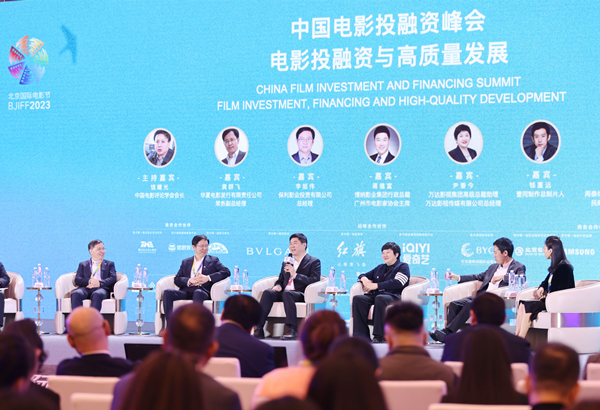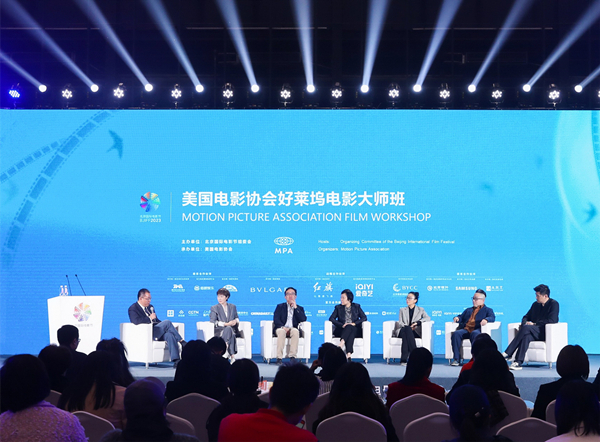Chinese filmmakers look to AI with hope, concern
- By Zhang Rui
 0 Comment(s)
0 Comment(s) Print
Print E-mail China.org.cn, May 7, 2023
E-mail China.org.cn, May 7, 2023

Hollywood writers demonstrate in Los Angeles, United States, May 2, 2023. [Photo/Xinhua]
The rapid rise of artificial intelligence (AI) has generated much discussion within the movie industry, with Chinese filmmakers now sharing their hopes and concerns about this revolutionary development.
Over 11,000 members of the Writers Guild of America went on strike earlier this week, concerned about the impact of AI technologies on their livelihoods. They are particularly worried about "generative" text and image tools like ChatGPT and Dall-E, which have the potential to significantly disrupt the industry. The union leading the protest is calling for regulations to be put in place to govern how studios use these tools.
On the other side of the Pacific, AI-generated content (AICG) was also a hot topic among Chinese filmmakers at the recently concluded 13th Beijing International Film Festival.
"I feel like we're facing something significant that our experiences cannot fully evaluate the implications of," said Huang Jianxin, the veteran producer behind such blockbusters as "The Battle at Lake Changjin," in an interview with China.org.cn. However, he believes that this is just a phase in the development of the arts and also an advancement of human beings that "we cannot resist."
During his masterclass at the film festival on April 27, renowned director Zhang Yimou expressed optimism about the development of AI but also emphasized the need for caution. While he believes that human beings will remain at the forefront in the long term, he acknowledged that AI could easily replace veteran storyboard artists or special effects and concept art designers during the production phase. Zhang also suggested that film crews could be streamlined, with only a few people working alongside AI, leading to a significant impact on the industry.
Some filmmakers have already started embracing AI, just as Smart Cinema CEO Jack Gao said, "AI won't replace people, but individuals who are knowledgeable about AI will replace those who are not."
For director Lu Chuan, the happiest part of his day is interacting with ChatGPT before going to bed, asking the chatbot to help him create movie posters. "The output generated in 15 seconds is better than what a professional poster company can do in a month," he exclaimed.
Yin Xiangjin, the general manager of Wanda Media, told China.org.cn that AI technologies can also help reduce investment risks in movie production by designing and showcasing scenes for investors in advance. Early simulations and AI technology can demonstrate the movie and determine the investment scale, which can improve technology and reduce costs and errors during actual shooting.

Film executives and investors take part in a panel discussion at the China Investment and Financing Summit held during the 13th Beijing International Film Festival (BJIFF), April 26, 2023. [Photo courtesy of BJIFF Organizing Committee]
Qian Zhongyuan, chief film and television producer at As One Production, revealed during the China Investment and Financing Summit on April 26 that his film project utilized AI in concept design. While the art team has used AI to quickly generate concept art and provide various useful visual options, Qian emphasized that human creativity is still necessary, with AI serving as a reference.
Jiang Defu, the CEO of Bona Film Group, stated that modern film production technologies, including AI, are crucial for achieving creative transformation and expressive creativity in films. He also mentioned that they are already considering using AI on some of their future projects.
In order to further explore the topic, the Motion Picture Association (MPA) organized a workshop on April 27 with industry leaders to discuss how technology will shape the industry's future. William Feng, head of Greater China and vice president of Asia Pacific for the MPA, noted that technological revolutions and industrialization have led to many milestone events and transformations throughout the 100-year history of world cinema.
Li Jie, senior vice president of Alibaba Pictures, identified three key AI technologies in the film and television industry: virtual production, text generation and generative art. According to Li, virtual production offers revolutionary solutions for challenging scenes, while AI text generation can assist in screenwriting. He also predicts that generative art technology will redefine poster design in as little as 24 months. Alibaba Pictures has already utilized AIGC technology in several film projects, as Alibaba Group released Tongyi Qianwen, its own chatbot trained on vast data, in April.
Zhu Liang, vice president of iQiyi and head of Intelligent Production, believes that AI tools will make content production more efficient and cost-effective, freeing up time and energy for human creativity. "In the future, the self-supervised learning and rapid iteration abilities of AI may surpass our imagination. However, this process shouldn't make us fearful or uneasy. Instead, as we gradually understand its capabilities and limitations, we can better control and utilize AI, helping it serve humans more effectively," Zhu said at the MPA workshop.

Film executives take part in a panel discussion at the Motion Picture Association Film Workshop held during the 13th Beijing International Film Festival (BJIFF), April 27, 2023. [Photo courtesy of MPA]
Rao Shuguang, president of the China Film Critics Association, pointed out, "AI can perform some basic tasks for us, reducing repetitive and homogeneous labor, and on this basis, we can further achieve better creativity and imagination."
In response to concerns about the technology, Wanda Media executive Yin Xiangjin said: "When something new emerges, it often has two sides. However, dismissing it solely because of its potential problems would be shortsighted. Instead, we should strive to find ways to address any challenges and improve it."
"For example, when the internet and new media platforms such as Douyin emerged, they became an irresistible trend. Rather than rejecting them outright, we should accept them and explore ways to make them work for us," Yin explained. "I, for one, will embrace it."






Go to Forum >>0 Comment(s)